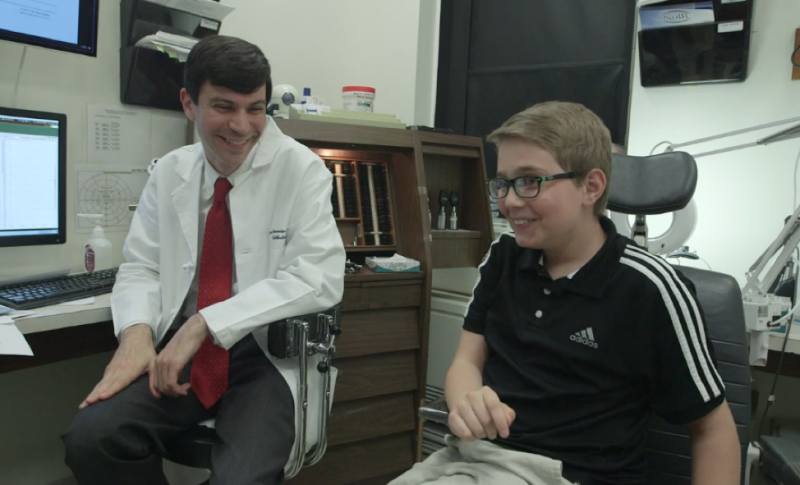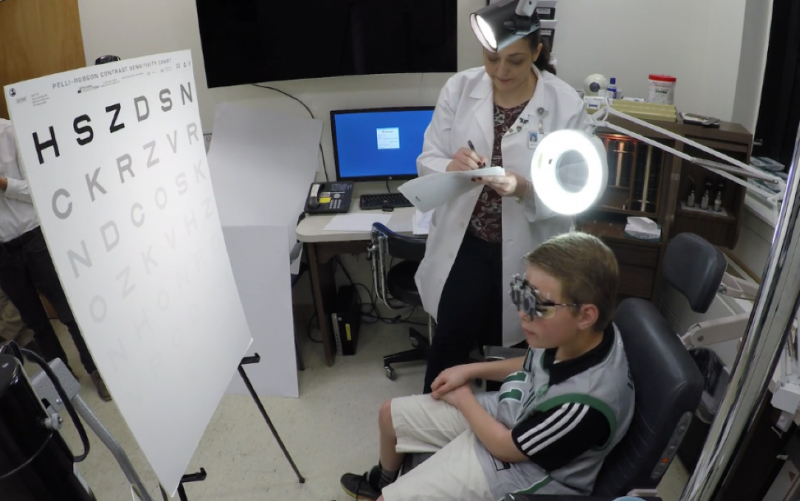Jack was born with an eye condition known as retinitis pigmentosa associated with RPE65 gene mutations. Two months ago, he was treated with a newly FDA-approved gene therapy drug known as Luxturna — and the results are life-changing.
“Mom, that was the best day ever,” Jack Hogan said when he noticed he could see the whiteboard in his classroom for the very first time without his visual aid.
In March, a Mass. Eye and Ear team led by Jason Comander, M.D., Ph.D., Associate Director of the Inherited Retinal Disorders Service, made history by performing the first FDA-approved gene therapy administration for any inherited disease. Their patient, 13-year-old Jack, has had retinitis pigmentosa associated with RPE65 gene mutations since birth. This degenerative disorder has caused Jack to struggle to see at night and with his peripheral vision. Some patients with Jack’s condition go blind by their 20s or 30s.
Last week, just two months after surgery, Jack came back to Mass. Eye and Ear for some vision testing — and the results were remarkable.

“It is truly amazing to see large improvements in Jack’s vision, which would have been impossible without this treatment,” said Dr. Comander.
Jack can now see in light that is six times dimmer, and he can read fine print that is 40 percent smaller. His visual acuity in the left eye improved from 20/100 before surgery to 20/70 after. His visual acuity in the right eye is stable at 20/80.
“These results are representative of just how big a moment this is for gene therapy. It is helping our patients, and it is here to stay,” added Dr. Comander.

A Life More in Focus
The groundbreaking treatment, commercially known as “Luxturna,” has already made a significant impact on Jack’s daily life.
“He really is a different kid,” said Jack’s mother, Jeanette. “He’s doing his homework on his own. Before, he was always struggling, because he couldn’t see. A lot of the things that we take for granted he couldn’t do, and now he can, which is wonderful. That’s all we really wanted for him.”
In particular, Jack is seeing much better at night and in places with dim lighting — like movie theaters and restaurants. He can now play outside with friends after dark. “I’ve never ridden my bike at all at night, and now I can,” said Jack.
What’s Next for Jack?
Jack will be back at Mass. Eye and Ear for follow-up visits every few months to check in with Dr. Comander and his care team.
That said — Luxturna is designed as a one-time therapy. Our hope is that the treatment will last throughout Jack’s lifetime.
For more on Jack’s story, watch the video above (download transcript), which was filmed at his recent follow-up visit.
Good Morning
My name Marianela
I am 48 years old, I would like to know if I could have some way to improve my vision because I suffer from astigmatism and myopia, and I feel that my vision advances every time, I currently use contact lenses, you are my hope to not lose my vision.
thank you
Marianela, thank you for reading. Please follow up with your doctor about this.
Bravo to both the Dr., his team and especially his brave patient.
Thanks, Deb!
Buenas tardes, tengo una hija de casi 3 años que padece esta misma enfermedad de Jack, somos de Costa Rica y no tenemos mucha información al respecto, me podrían ayudar por favor!
Jessica, thank you for your comment. Please see this link for information for international patients at Mass. Eye and Ear.
Hello,
Thanks for the article.
Are there any resources or forums to discuss between patients being treated with Luxturna? I find a lot of financial or scientific articles, but very few testimonials from patients (or their family)
Thanks
Hi Andie, we will continue to share stories like Jack’s here on Focus, so stay tuned. Additionally, the company that developed Luxturna has a website with patient stories that may be worth checking out. Best wishes.
This story is amazing. I have a sibling with progressed RP and over 50 yrs old -are there any gene therapy surgery /treatment options for that stage of progression? And, does the surgery slow the progression or stop it?
Thank you,
Do you guys have other clinical trials for humans with other RP gene mutations?
I am 65 years old, I have RP. I noticed my vision getting worse all the time. I would love to speak to someone to see if there is any hope for me to improve my vision. I also have two brothers with the same condition except one of them was born deaf . Would appreciate your help
hi I have ritinitis pigmentosa
I am 32 years old
and I can not see at night
would you please help me for treatment
I am 60 years old and was diagnosed with RP 27 years ago. Since then I have lost significant vision loss in acuity and field vision. I have only a 8% field of vision in one eye and a little more than 9% in the other. This disease is rampant in my family, we have had 9 positive cases so far. I’m very excited for Jack and the wonderful results he has experienced. Did he have improvement in his field vision? I will be paying close attention to this new treatment and hope to be included in trials when made available outside of Mass.
Hi Angie, thanks for reading, Jack is doing great and has had improvement in his vision. This treatment is FDA-approved for patients with RP caused by RPE65 mutation. Genetic testing can help determine if you’re a candidate (for this treatment, and other clinical trials of different therapies).
Very interesting that RP is being now treated. I have a relative, now 56, losing his eyesight at 25, due to RP.
Is there a possibility of having an online consultation please?
just checking in want to get started as soon as possible thanks
Hi Clara, I’m not sure what you’re referring to in your comment, can you email communications@meei.harvard.edu to provide more info? Thanks
Hello,
My name is Cristina and my husband was diagnosed with RP (affected gene is P-Care C.1883-1887 aka C20RF71) 7 years ago. During the last 2-3 years he has lost most of his vision. Is this clinic treating this gene or are there any clinical trials? we would like to know if he would like to be a good candidate for an appointment, we live in Texas, therefore, any information would be greatly appreciated. Thank you!
Hi Cristina, we have an Inherited Retinal Disorders service you can seek a consultation with, with a physician referral. Here’s more information and some of the conditions they treat. https://www.masseyeandear.org/specialties/ird
I am Abizar vejlani from Tanzania,my son Hatim is 17yrs old,he is diagnosed with RPE 65 since his childhood,I read jacks story and I got some hopes for my son
I wish to bring my son come to Dr Jason comander
Pls I need some guidance